Androgen Modulates Functions of Endothelial Progenitor Cells through Activated Egr1 Signaling
- PMID: 26697079
- PMCID: PMC4677258
- DOI: 10.1155/2016/7057894
Androgen Modulates Functions of Endothelial Progenitor Cells through Activated Egr1 Signaling
Abstract
Researches show that androgens have important effects on migration of endothelial cells and endothelial protection in coronary heart disease. Endothelial progenitor cells (EPCs) as a progenitor cell type that can differentiate into endothelial cells, have a critical role in angiogenesis and endothelial protection. The relationship between androgen and the functions of EPCs has animated much interest and controversy. In this study, we investigated the angiogenic and migratory functions of EPCs after treatment by dihydrotestosterone (DHT) and the molecular mechanisms as well. We found that DHT treatment enhanced the incorporation of EPCs into tubular structures formed by HUVECs and the migratory activity of EPCs in the transwell assay dose dependently. Moreover, microarray analysis was performed to explore how DHT changes the gene expression profiles of EPCs. We found 346 differentially expressed genes in androgen-treated EPCs. Angiogenesis-related genes like Egr-1, Vcan, Efnb2, and Cdk2ap1 were identified to be regulated upon DHT treatment. Furthermore, the enhanced angiogenic and migratory abilities of EPCs after DHT treatment were inhibited by Egr1-siRNA transfection. In conclusion, our findings suggest that DHT markedly enhances the vessel forming ability and migration capacity of EPCs. Egr1 signaling may be a possible pathway in this process.
Figures

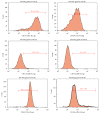
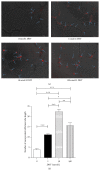
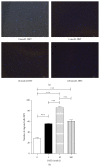


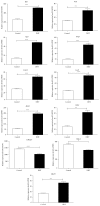

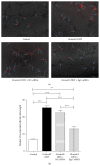
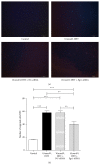
References
-
- Dubey R. K., Jackson E. K. Estrogen-induced cardiorenal protection: potential cellular, biochemical, and molecular mechanisms. The American Journal of Physiology—Renal Physiology. 2001;280(3):F365–F388. - PubMed
-
- Martín-Merino E., Johansson S., Morris T., Rodríguez L. A. G. Androgen deprivation therapy and the risk of coronary heart disease and heart failure in patients with prostate cancer: a nested case-control study in UK primary care. Drug Safety. 2011;34(11):1061–1077. doi: 10.2165/11594540-000000000-00000. - DOI - PubMed
-
- Ng M. K. C., Quinn C. M., McCrohon J. A., et al. Androgens up-regulate atherosclerosis-related genes in macrophages from males but not females: molecular insights into gender differences in atherosclerosis. Journal of the American College of Cardiology. 2003;42(7):1306–1313. doi: 10.1016/j.jacc.2003.07.002. - DOI - PubMed
LinkOut - more resources
Full Text Sources
Other Literature Sources
Molecular Biology Databases

